
Emmeline Pankhurst was a British political activist who organised the British suffragette movement and helped women to win in 1918 the right to vote in Great Britain and Ireland. In 1999, Time named her as one of the 100 Most Important People of the 20th Century, stating that "she shaped an idea of objects for our time" and "shook society into a new pattern from which there could be no going back". She was widely criticised for her militant tactics, and historians disagree about their effectiveness, but her work is recognised as a crucial element in achieving women's suffrage in the United Kingdom.
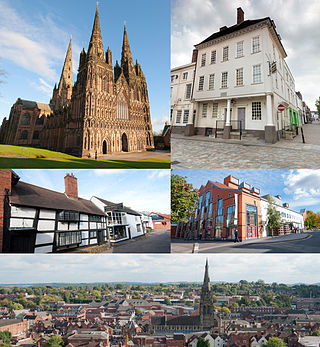
Lichfield is a cathedral city and civil parish in Staffordshire, England. Lichfield is situated 18 miles (29 km) south-east of the county town of Stafford, 9 miles (14 km) north-east of Walsall, 8 miles (13 km) north-west of Tamworth and 13 miles (21 km) south-west of Burton upon Trent. At the time of the 2021 Census, the population was 34,738 and the population of the wider Lichfield District was 106,400.

Estelle Sylvia Pankhurst was an English feminist and socialist activist and writer. Following encounters with women-led labour activism in the United States, she worked to organise working-class women in London's East End. This, together with her refusal in 1914 to enter into a wartime political truce with the government, caused her to break with the suffragette leadership of her mother and sister, Emmeline and Christabel Pankhurst. Pankhurst welcomed the Russian Revolution and consulted in Moscow with Lenin. But as an advocate of workers' control, she rejected the Leninist party line and criticised the Bolshevik regime.
The Women's Institute (WI) is a community-based organization for women in the United Kingdom, Canada, South Africa and New Zealand. The movement was founded in Stoney Creek, Ontario, Canada, by Erland and Janet Lee with Adelaide Hoodless being the first speaker in 1897. It was based on the British concept of Women's Guilds, created by Rev Archibald Charteris in 1887 and originally confined to the Church of Scotland. From Canada the organization spread back to the motherland, throughout the British Empire and Commonwealth, and thence to other countries. Many WIs belong to the Associated Country Women of the World organization.

Dame Christabel Harriette Pankhurst was a British suffragette born in Manchester, England. A co-founder of the Women's Social and Political Union (WSPU), she directed its militant actions from exile in France from 1912 to 1913. In 1914, she supported the war against Germany. After the war, she moved to the United States, where she worked as an evangelist for the Second Adventist movement.

Rudolf Ivanovich Abel is the alias of William August Fisher, a Soviet intelligence officer, created to alert his Soviet KGB handlers when Fisher was arrested in the USA on charges of espionage by the FBI in 1957.

The Women's Social and Political Union (WSPU) was a women-only political movement and leading militant organisation campaigning for women's suffrage in the United Kingdom founded in 1903. Known from 1906 as the suffragettes, its membership and policies were tightly controlled by Emmeline Pankhurst and her daughters Christabel and Sylvia. Sylvia was eventually expelled.
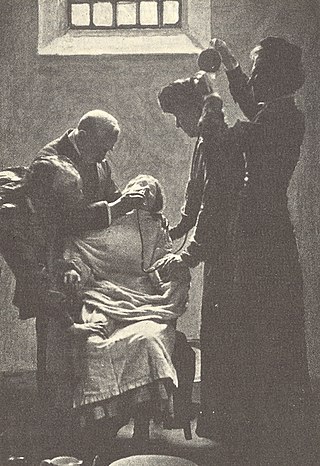
Force-feeding is the practice of feeding a human or animal against their will. The term gavage refers to supplying a substance by means of a small plastic feeding tube passed through the nose (nasogastric) or mouth (orogastric) into the stomach.

Adela Constantia Mary Walsh was a British-born suffragette who worked as a political organiser for the Women's Social and Political Union (WSPU) in Scotland. In 1914 she moved to Australia where she continued her activism and was co-founder of both the Communist Party of Australia and the Australia First Movement.
The Associated Country Women of the World (ACWW) is the largest international organization for rural women, with a membership of nine million in 82 countries. ACWW holds a triennial conference and publishes a magazine, The Countrywoman, four times a year.

Black Friday was a suffragette demonstration in London on 18 November 1910, in which 300 women marched to the Houses of Parliament as part of their campaign to secure voting rights for women. The day earned its name from the violence meted out to protesters, some of it sexual, by the Metropolitan Police and male bystanders.

Charlotte Despard was an Anglo-Irish suffragist, socialist, pacifist, Sinn Féin activist, and novelist. She was a founding member of the Women's Freedom League, the Women's Peace Crusade, and the Irish Women's Franchise League, and an activist in a wide range of political organizations over the course of her life, including among others the Women's Social and Political Union, Humanitarian League, Labour Party, Cumann na mBan, and the Communist Party of Great Britain.

A movement to fight for women's right to vote in the United Kingdom finally succeeded through acts of Parliament in 1918 and 1928. It became a national movement in the Victorian era. Women were not explicitly banned from voting in Great Britain until the Reform Act 1832 and the Municipal Corporations Act 1835. In 1872 the fight for women's suffrage became a national movement with the formation of the National Society for Women's Suffrage and later the more influential National Union of Women's Suffrage Societies (NUWSS). As well as in England, women's suffrage movements in Wales, Scotland and other parts of the United Kingdom gained momentum. The movements shifted sentiments in favour of woman suffrage by 1906. It was at this point that the militant campaign began with the formation of the Women's Social and Political Union (WSPU).

A suffragette was a member of an activist women's organisation in the early 20th century who, under the banner "Votes for Women", fought for the right to vote in public elections in the United Kingdom. The term refers in particular to members of the British Women's Social and Political Union (WSPU), a women-only movement founded in 1903 by Emmeline Pankhurst, which engaged in direct action and civil disobedience. In 1906, a reporter writing in the Daily Mail coined the term suffragette for the WSPU, derived from suffragistα, in order to belittle the women advocating women's suffrage. The militants embraced the new name, even adopting it for use as the title of the newspaper published by the WSPU.
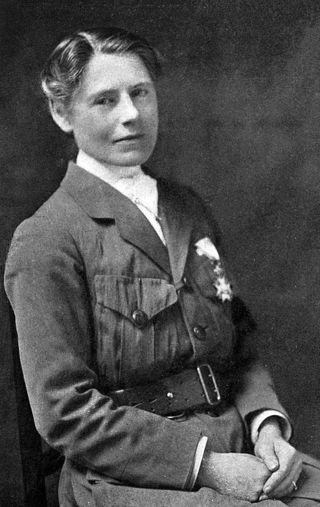
Evelina Haverfield was a British suffragette and aid worker.

Mary Grant (1831–1908) was one of the most eminent female sculptors of 19th century Britain, with numerous commissions from the rich and famous.

The Emmeline and Christabel Pankhurst Memorial is a memorial in London to Emmeline Pankhurst and her daughter Christabel, two of the foremost British suffragettes. It stands at the entrance to Victoria Tower Gardens, south of Victoria Tower at the southwest corner of the Palace of Westminster. Its main feature is a bronze statue of Emmeline Pankhurst by Arthur George Walker, unveiled in 1930. In 1958 the statue was relocated to its current site and the bronze reliefs commemorating Christabel Pankhurst were added.
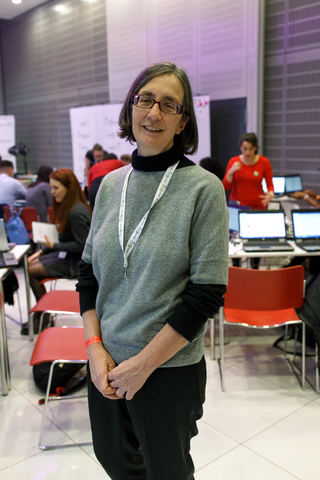
Helen Pankhurst is a British women's rights activist, scholar and writer. She is currently CARE International's senior advisor working in the UK and Ethiopia. She is the great-granddaughter of Emmeline Pankhurst and granddaughter of Sylvia Pankhurst, who were both leaders in the suffragette movement. In 2018 Pankhurst convened Centenary Action, a cross-party coalition of over 100 activists, politicians and women's rights organisations campaigning to end barriers to women's political participation.

Catherine Emily Pine was active in the women's suffrage movement in Britain. She nursed the suffragette Emmeline Pankhurst and her son Henry. Pine travelled with Pankhurst until she decided to move back to Britain permanently in 1924.
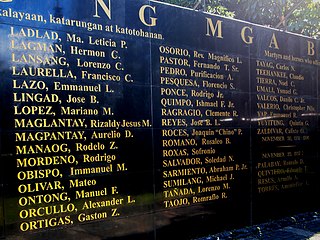
Maria Leticia Quintina Jimenez Pascual-Ladlad, also known by her nickname Tish, was a student journalist at the University of the Philippines Los Baños (UPLB) during the Marcos dictatorship, known for being the first woman editor-in-chief of the Aggie Green and Gold, for her community organizing work among farmers in Laguna and Quezon, and for being the first UPLB student to become a desaparecido during the Martial Law regime.


















